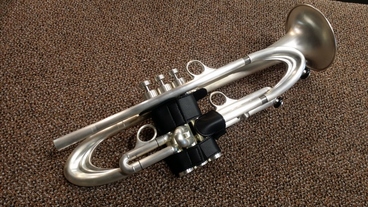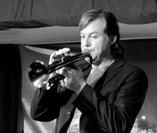 Someone recently told me (in a somewhat long rant) that they do not like high efficiency trumpets. My response was the following: What you mean to say is that you prefer to work harder, experience less efficiency and play at a level less than your potential. You would rather drive a Ford model T cornering at 15 mph than a Tesla cornering at 85 mph. You like to work hard and receive very little output for your work because this is a habit. It is true that many players do prefer working hard to play the trumpet. From my experience working with thousands upon thousands of players, almost all people do prefer a more efficient setup that results in, "more sound and less effort". The real problem is that most people think they, as the individual, are right about everything they understand in their personal life experience. This is where the psychology comes into play far more than the bio-feedback system. By resisting new ideas and experiences due to preconceived bias, you will almost certainly lead yourself to your expected outcome. If you say you won't like "xyz" due to a preconceived bias and then try it, you are not likely to give it an objective chance to fit within the realm of what you have previously known to like such as "abc". This bias truly prevents almost everyone in the world from experiencing reality. I know this is true because I have suffered strokes my entire life. After a major stroke, I lose my conscious memory, all of it. This means I've had to learn to walk, talk, write and play trumpet multiple times in my life. And I have forgotten the vast majority of my childhood, teen and early adult years of my life. And do you know what I have learned from these experiences? You're all a bit crazy! Seriously, every single person I know has strange unexplainable tendencies and beliefs that are on the magnitude of being extremist for no real reason. When asked "why" someone has a particular bias, the response is often something simple like, "I just don't like...". But when you've suffered a stroke and you're seeing the world fresh for the first time with no memory of bias, you can easily see that people live their lives by a personal code unrecognized by their own conscious mind that drives them to make choices beyond their objective free will. And yes, trumpet players suffer from extreme bias against modern technology, research and development and visual aesthetics. If it wasn't made by the mythical masters like Benge, Schilke and Bach, then it is an invalid option that should not exist. In many minds, these men understood everything there ever was to know about brass instrument acoustics and nothing can ever be improved upon their work. They were the masters of their art, the Stradivari of their time and we should stand and recognize their horns as the best in the world for all time. Some of you are nodding, saying, "of course, Bach was a genius and his horns are the best in the world". And others are thinking, "Bach was possibly a great genius and one of the best trumpet builders in his day, but humanity continues and things get better with time". My reality is probably closer to "reality". Bach was a genius, yet he was short-sighted due to the great successes he experienced throughout his lifetime. He did not experience enough hardship, enough challenge and likely, enough skepticism from his clientele. He basically improved upon a preexisting design that he and other professionals preferred. Then he found ways to personalize options to work with individuals. As his success and business grew, he created a production line and was financially successful. What is missing from Vincent Bach's career as a "genius" brass instrument builder? Innovation. He was a great businessman and a great trumpet player, but he did not innovate. In fact, I argue that his designs were nearly stagnant throughout his entire career. Do I respect his work? Yes. Do I like the sound of his instruments? Yes, I have owned over 100 Bach trumpets. Would I play one on a daily basis? Only if I were living in 1990 or earlier. Schilke was a great trumpet player like Bach and Benge. He preferred vibrancy in the tone and wanted to experience a lot of feedback from the perspective of the player at the expense of projection to the audience. He commissioned and performed a small amount of acoustics research, but threw out most of the important findings in lieu of personal bias. His personal bias was in fact what held him back from discovering some of the greatest advances in brass instrument design. Or perhaps he did make these discoveries, but withheld them because they did not fit his paradigm. Either way, Schilke proved that his potential for innovation was limited by the expectations of tradition regardless of whatever his true intentions may have been. And Benge? I believe Benge just wanted to build trumpets and live a good life. Innovation was not a consideration as is obvious from the output of his company. Schilke and Benge built nice horns, but they lacked innovation in almost every way possible. This is a good lesson for any business people out there reading...you don't have to innovate to be successful. What is my point? Most of you prefer antiquated designs simply because you were trained to like them. And in the process of learning social trumpet player norms, you also learned to reject new technology, designs, aesthetics and concepts. You may be thinking this cannot be true, but young players only have these biases after someone has given them their version of guidance. I have been focused on the young player segment of our brass playing community since 1996. I have been out there educating, sharing and asking questions of 5th graders through college students. And guess what's happening? They are learning about the physics involved in musical instruments on a level many of you have yet to grasp. They get it because they were introduced to the science of sound before they could play the Kennan or Arutunian. And they are extremely interested in learning about and experiencing Standing Wave Efficiency. This very moment is an opportunity for every single person reading. Consider your biases and admit that you may not know why you have them. Then question whether or not your bias is justified by reality or simply by a few short experiences that you did not fully understand. Perhaps the source of your bias was just a few, "words of wisdom" from a friend, colleague or mentor? Take this one step further and consider more serious biases you embrace outside of being a musician or trumpet player. What other parts of your reality don't quite add up? How can you change your perspective? How can you be more accepting and understanding of ideas other than what you have known? I encourage all of you to suffer a major stroke, lose your memory and experience life as a newborn in terms of how your mind interprets the world. Truly, waking up that first day is magical. Everything in the world feels like the greatest miracle. I recall seeing grass and trees for the first time. I literally got down on the grass and looked at it as close as possible and found an ant. Then I started sobbing uncontrollably as I began taking in the wonderful miracle of life on this planet. Yeah, that sounds pretty extreme, but do you remember waking up for the first time as a newborn? Probably not. Some of you have suffered major brain trauma and may relate to my experiences. Either way, we live in a beautiful world of possibilities and my innovations are part of our world. I'm not here to disrupt your reality so much as help you see possibilities. Concerning SWE, which is Standing Wave Efficiency. I coined this term, not for marketing as some may claim, but to sum up what actually happens to the sound wave inside a musical instrument. The "efficiency" is simply a measurement of energy in the wave as it relates to linear distance in the tube. A high efficiency instrument that exhibits more SWE will convert less of the anti-nodal high pressure into vibration of the tube throughout the instrument. It is that simple. No marketing jargon, just real physics. I have had so many laymen tell me that SWE does not exist and cannot exist, but in reality they just don't understand the definition. Standing Wave Efficiency is literally the amount of energy converted into vibration of the instrument versus the amount of energy remaining in the wave at the end of the bell. On the flip-side, I have had great conversations with hundreds of scientists over the years on the topic of SWE. I didn't invent efficiency, nor did I invent the standing wave as these are both concepts in science. I simply applied specific methods of design, structural analysis and production of brass instruments to reduce the transfer of energy from anti-nodal pressure into vibration of the instrument wall. Scientists get this with one exception, they often want to read published studies on the subject. This gets into another conversation about the value of research, development and findings that increase the value of my products. I certainly have no interest in releasing my life's work to the general public where my competitors can ride on my shoulders. Bio-feedback is another consideration and one of my favorite topics, which should not be confused with SWE. They are two completely independent subjects and my VPS or Variable Performance System addresses bio-feedback and the physiological psychology of Impedance variables within brass instruments. In short, the VPS is a system that allows us to adjust the Summit and Muse models to fit the playing preferences of every single trumpet player. I have taught Masterclasses on the Physics of Brass Instruments for over twenty years. I truly enjoy sharing my experiences both with brass players and in the form of scientific findings. I've presented at the University of North Texas, Georgia Tech, Metro State University, U of Oklahoma, U of Nebraska, U of Kansas, Montana State, Hofstra in NY, Loyola in New Orleans and numerous other colleges, universities and educational institutions. If your organization is interested in hosting a masterclass on the Physics of Brass Instruments, please contact Jennifer Sandquist at [email protected] or submit a comment below. You can read more about SWE and VPS on my website and in here in my blog. Or you can watch the following six-part video series which is a lecture I gave at McNally Smith Music College a few years ago.
1 Comment
Ron Huckfeldt
4/2/2016 03:04:49 pm
Thank you Jason. I appreciate your comments very much. I'm a trumpet player and friend of James Knaabe. I am looking forward to playing one of your trumpets/ flugelhorns some day soon. However, my profession and how I make a living for the past 20+ years has been as a physical therapist. I work with individuals who have unfortunately suffered a stroke on almost a daily basis. I would ask of you to not encourage people to have one.
Reply
Your comment will be posted after it is approved.
Leave a Reply. |
Jason Harrelson
Inventor, Musician, Educator and Founder of Harrelson Trumpets, Trumpet Momentum and Harrelson Momentum. Archives
July 2024
|


 RSS Feed
RSS Feed
